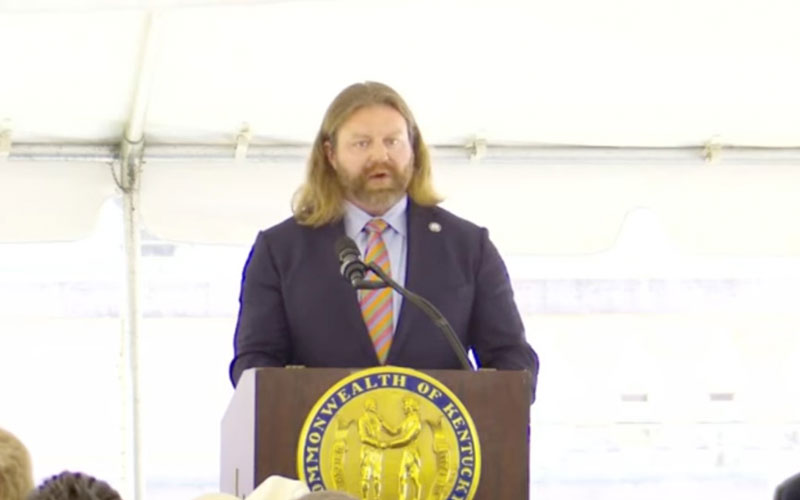Bryan Hubbard, who championed a proposal to fund clinical trials of ibogaine for treating opioid addiction in Kentucky, announced his resignation on Dec. 26 as chairman and executive director of the state’s Opioid Abatement Advisory Commission.
In a letter to Kentucky Attorney General Daniel Cameron, Hubbard explained that he made the decision to resign, effective Dec. 31, “[a]fter a stark discussion” with Attorney General-elect Russell Coleman.
On Dec. 19, Coleman said Chris Evans, the former acting administrator of the DEA, will head the Kentucky Opioid Abatement Advisory Commission when Coleman takes office in January.
The commission is charged with distributing more than $842 million in opioid-lawsuit settlements – Kentucky’s chunk of a multistate agreement with opioid producers for their role in the national opioid epidemic. In Kentucky, 7,665 people have died from overdoses since 2019.
Hubbard spearheaded an initiative to allocate $42 million in opioid-settlement money to fund clinical trials of ibogaine, a Schedule 1 substance that has shown promise in treating addiction.
Ibogaine is a psychoactive compound found in the root bark of Tabernanthe iboga, a shrub native to Central and West Africa. Studies have shown that ibogaine can help treat heroin, cocaine and opioid addiction, although it poses some documented cardiac risks.
At a May 31 press conference, Hubbard announced plans to make Kentucky the first state to fund clinical research of ibogaine. Hubbard was joined by Cameron as well as representatives from the Veteran Mental Health Leadership Coalition, Reason for Hope, Heroic Hearts Project and Veterans Exploring Treatment Solutions.
“We are here to announce Kentucky’s breakthrough opportunity” in the fight against opioid addiction, Hubbard declared at the press conference.
“ … Anecdotal evidence that is a mountain high and decades wide suggest that ibogaine, within 48 to 72 hours of administration in safe, clinically controlled conditions, resolves opioid-withdrawal syndrome. It appears to do so by clearing and resetting the brain’s opioid receptors while also restoring the brain’s organic dopamine and serotonin production to pre-opioid exposure levels. If this anecdotal evidence can be clinically validated, ibogaine would represent a transformative therapeutic for treatment of opioid-use disorder.”
In the months following the press conference, the commission hosted several public hearings on Hubbard’s proposal, and heard from individuals who have had success with ibogaine in their own struggles with addiction.
Future Uncertain
With Hubbard’s impending departure, the future of Kentucky’s ibogaine project is unclear. When Coleman announced Evans as his pick to lead the commission, the Lexington Herald Leader reported that “neither Coleman [n]or Evans gave a definitive answer about whether the commission would continue pursuing Hubbard’s proposal.”
“There’s been a lot of ink spilled on ibogaine,” Coleman said, as reported by the Herald Leader. “My concern is that we are not focused as intently as we should be on the prevention piece of this.”
In his resignation letter, Hubbard said his “greatest concern” is “the future viability” of the project.
“This endeavor, inspired by the spirit of Kentucky’s resilience, aimed to position the commonwealth as a leader in neurobiological research and bring healing to our communities that have been devastated by the opioid epidemic,” Hubbard wrote. “Despite facing opposition, we persevered, and the bipartisan support from far and wide was a testament to our shared belief in the potential for revolutionary transformation in the fight against the opioid epidemic.”
He concludes the letter on a hopeful note: “The Kentucky Ibogaine Project’s legacy will live on, and the day will come when its healing power reaches every individual in need.”
Reasons for Optimism
Other stakeholders struck a similar tone in their responses to Hubbard’s resignation.
Veterans Exploring Treatment Solutions (VETS), a nonprofit founded by retired U.S. Navy Seal Marcus Capone and his wife, Amber, expressed optimism that Hubbard’s efforts in Kentucky haven’t been in vain.
“We salute the many months of effort of the dozens of veterans, patients, parents, scientists, doctors, therapists, harm-reduction advocates and federal regulators who dedicated their time and knowledge to testifying in support of the proposal to allocate $42 million (5%) of the state’s share of opioid settlement funds to research into ibogaine therapy to treat opioid addiction,” VETS said in a statement. “We are disappointed that this cutting-edge, potentially life-saving research will not be taking place in the Bluegrass State, but this is only the beginning of our efforts.”
The organization asserted that the Kentucky ibogaine project is the beginning of a broader national, multi-partisan effort to gain ibogaine approval in other states.
“The opioid crisis necessitates a united and coordinated response at both state and federal levels, and VETS will never back down,” the organization added.
Even if Kentucky’s ibogaine project faces obstacles with a new attorney general, there’s a silver lining, says Brett Waters, founder and executive director of Reason for Hope, a nonprofit dedicated to increasing access to breakthrough therapies.
The collective effort in Kentucky has created “a comprehensive public record featuring hours of near unanimously supportive testimony,” he says.
The commission heard expert testimony from Dr. Javier Muniz, a supervisory general health scientist for controlled substances at the U.S. Food and Drug Administration. Muniz affirmed that ibogaine has the potential to receive an FDA “breakthrough therapy” designation.
“Mr. Hubbard and the commission deserve praise for their trailblazing work and the incredible amount of knowledge and expertise they amassed through this process for the benefit of not only Kentuckians, but our nation writ large,” Waters said in a statement.

